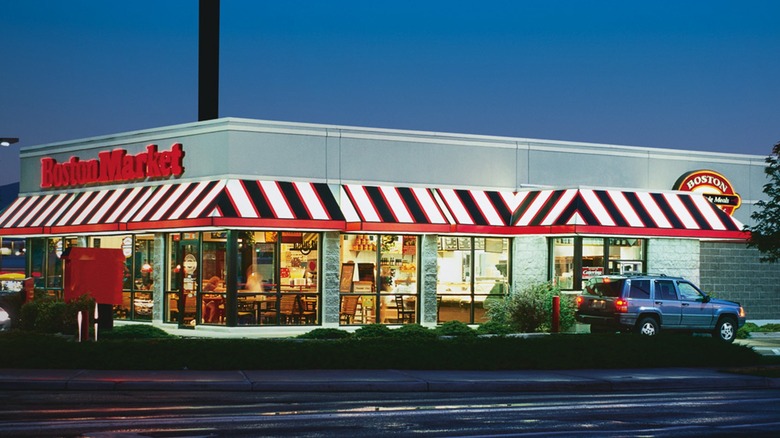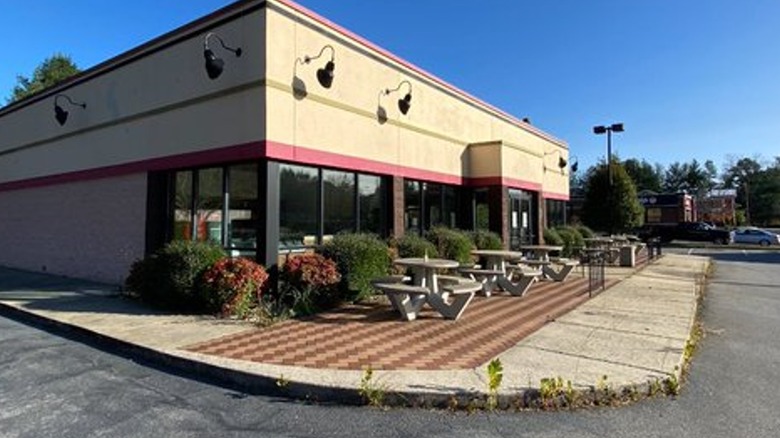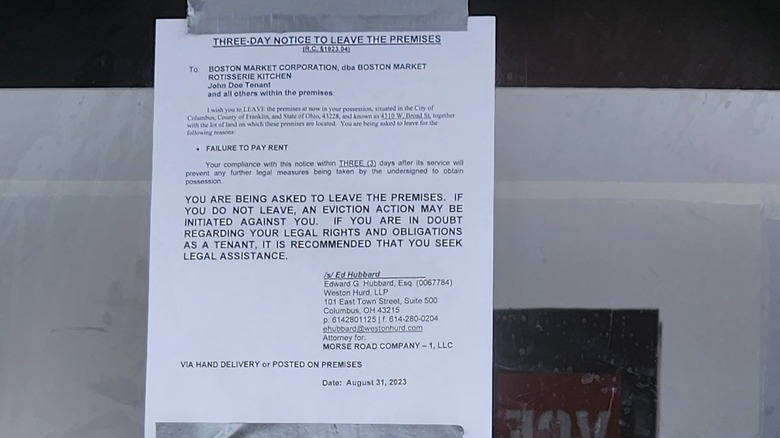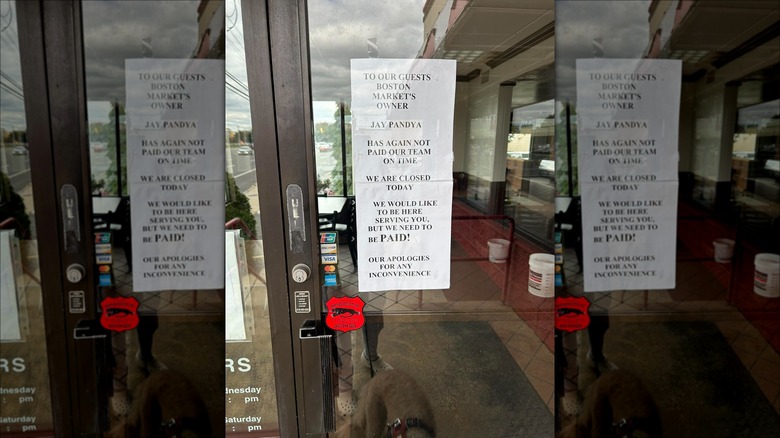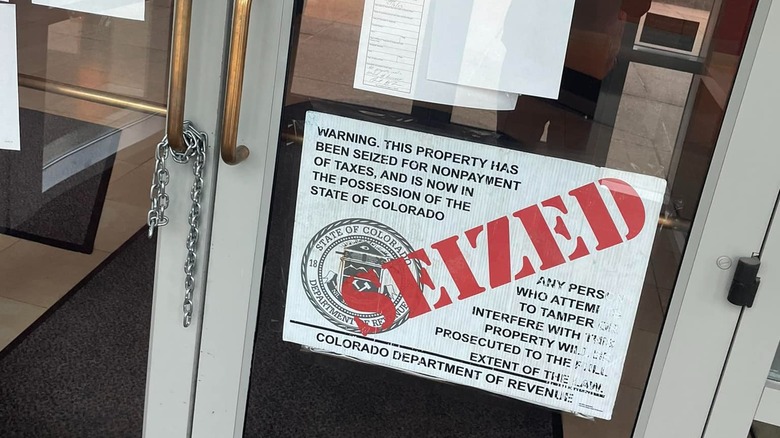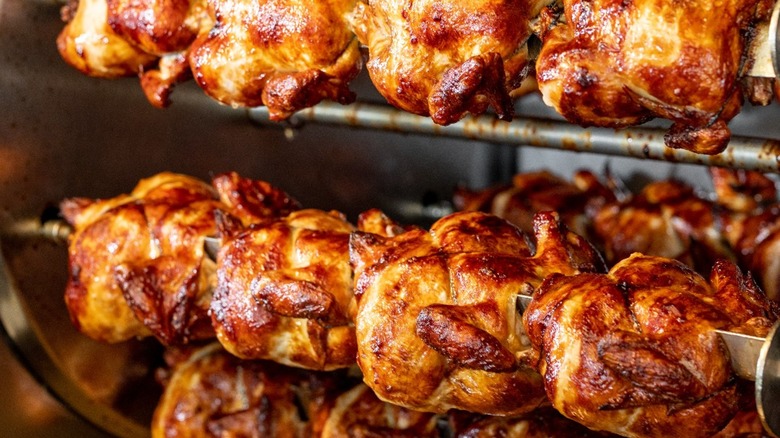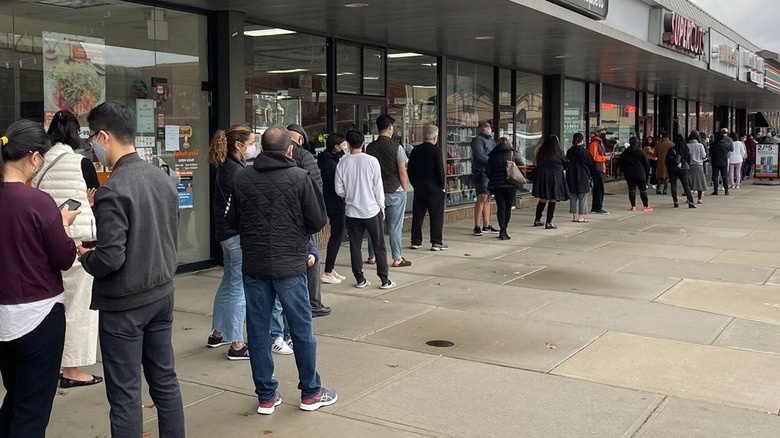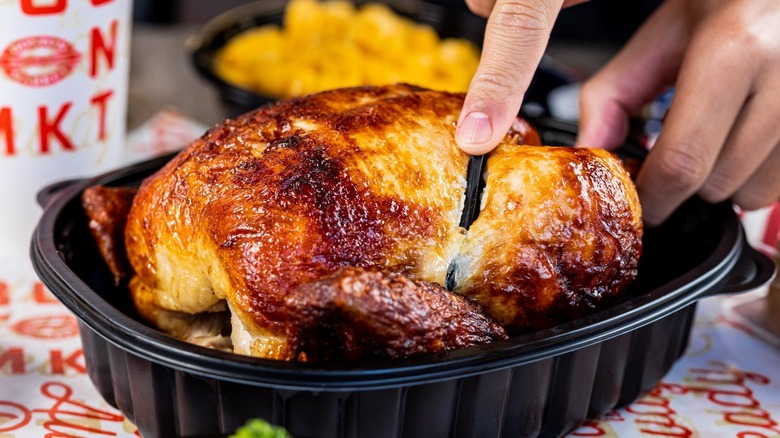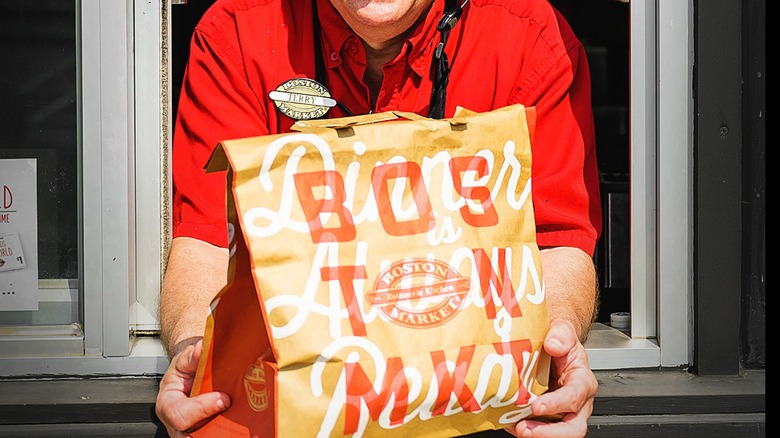13 Signs Boston Market Is Struggling
The promise of tasty rotisserie chicken and homestyle sides was a draw for diners, but all the signs seem to point to Boston Market's struggle to stay open. Like many restaurants, it has suffered from an inability to evolve to become what modern diners want. However, its problems go much deeper than its inability to understand the trends. Some of its problems resemble self-sabotage as the current owner accumulates debts it fails to pay. With lawsuits abounding, it's likely the chain won't be around long. However, it's already disappeared in many places without most noticing.
The food and service are no longer any more dependable than employees getting paychecks and vendors getting paid. So, the writing is on the wall, and it may be a restaurant we lose soon unless someone new swoops in to save it. If you're wondering what's happening to Boston Market, we've delved deep into everything that has been happening to this once beloved restaurant as it seems to be drawing its dying breaths.
1. New owners keep passing it on like a hot potato
Boston Market seemed to have big potential when it first came on the scene, being passed around among several big-name players. Boston Market opened in 1985 as Boston Chicken, under the ownership of Steven Kolow and Arthur Cores. The idea was to create a casual restaurant that sold fresh, healthy everyday food in Boston rather than gourmet fare. In 1989, they sold the chain to George Nadaff, who had opened the first KFC in the Boston area. Then, an executive at Blockbuster Video, Saad J. Nadhir, and his Blockbuster partner Scott Beck snatched it up in 1991. It went public in 1993, and the owners changed the name to Boston Market in 1995.
The chain was doing $1 billion a year in sales in 1997, so the owners thought they would try taking it international. Unfortunately, this plan resulted in bankruptcy in 1998. However, McDonald's still felt the chain was a good gamble and bought it in 2000. Under McDonald's, the brand started selling frozen foods in grocery stores.
McDonald's let go of the chain in 2007, selling it to Sun Capital Partners. Then, Sun Capital Partners passed it on to Engage Brands. LLC, in 2020. Engage Brands is ultimately owned by multi-millionaire Jignesh "Jay" Pandya. The chain was hopeful that Pandya's backing would help pull the company out of its financial problems. However, it has continued to struggle more than ever before under his ownership.
2. It keeps closing more stores
In 1998, when the Blockbuster duo tanked Boston Market and had to declare bankruptcy, there were 1,143 locations. That year, the chain would close around 400 stores. By the time Sun Capital bought it from McDonald's in 2007, the number of restaurant locations had dwindled to 630.
Under Sun Capital, the number of open locations decreased even more. 2013 was the first year the chain opened a new restaurant under Sun Capital's ownership, but it still only had 462 restaurants. By 2019, it had only 409 locations, meaning it had 35% fewer locations than the 630 when it bought the chain.
Boston Market has fared even worse under its current ownership with Engage Brands. Everything seemed hunky-dory at first, with the new owners opening 41 restaurants by April 2021 at a rate of two new restaurants per week. It even resurrected some long-dead restaurants. However, that trend was short-lived. About 50 locations have closed in 2023 alone. As of October 2023, the website lists 262 open locations in 23 U.S. states and Guam. However, it doesn't seem that the locations are being regularly updated on the company website since we noticed some still listed that are permanently or temporarily closed.
3. Unpaid bills to vendors and landlords are sparking lawsuits
Under its current ownership, Boston Market seems to have given up the idea of paying bills to an ever-growing list of vendors, food distributors, and landlords. An anonymous former Boston Market executive told Nation's Restaurant News, "From what I've heard, the owner said he didn't care if they sued him; he thought it was funny. From what I understand, he picked up the organization for cheap. ... I think he was just trying to maximize profits for the first few years he had ownership and now he's just letting it bleed out."
In July 2023, U.S. Foods lodged a complaint with an Illinois District Court that Boston Market owes them around $11 million for food it has purchased, received, and never paid for throughout 2022 and 2023. Another food distributor in Fort Worth, Texas, Ben E. Keith, has taken out a lawsuit against the chain for another $1 million in unpaid invoices. Another company that has sued the chain is a data analytics company called SiteZeus. Still, another is a refrigerator rental company called Polar Leasing Company.
Along with not paying for food and services, the chain has stopped paying rent in several locations. Apparently, McDonald's stayed on as the landlord for several locations, so McDonald's has gotten in on the landlord suing action as well.
4. It's not paying employees
Not only is Boston Market skimping on paying its vendors and landlords, but it's not always paying its employees on time, either. Redditors from Ohio, Maryland, California, and Florida all confirmed the tendency to not get paid on time. Redditor u/Waste-Ad-5057 said, "[T]his weekend my Boston market is closed down because no one got paid on Friday again, have to wait and hope it happens Monday 5/22. Not paying employees on time is a company-wide problem that's happened multiple time[s]" since January 2023." Eventually, the company pays up, but it certainly doesn't instill confidence in employees.
This habit of not paying employees goes back to 2021. Since then, several groups of employees have banded together to sue the company for not paying them. New York employees banded together in 2021 to sue the company for failing to pay them on time. Arizona employees sued the company in 2021 for not paying them at least minimum wage and not giving them overtime pay. In June 2023, employees at nearly all the Massachusetts locations sued the company for not paying them. Then, in August 2023, the New Jersey Department of Labor stepped in when it found that the company was paying its employees late or not at all. There were other complaints, too, like not paying sick leave and not keeping proper employee records.
5. Government officials are stepping in to close down stores and headquarters
Government officials around the U.S. have ended up closing down stores and headquarters states as the non-payment problem worsens. An official for the New Jersey Department of Labor said it was glad it had "the tools to carry out large-scale enforcement efforts within the state so we can work with employers to stop worker exploitation, create sustainable change, and prevent future violations." However, he said, "With restaurants across the country, Boston Market needs to set a better example for fair treatment of its workers."
The New Jersey Department of Labor closed 27 locations in August 2023. Those closedowns came with over $2.5 million in fines to cover back wages, fees, and damages. The closures were only temporary, and the chain was allowed to reopen the locations once it paid the 314 employees their paychecks (over $600,000) and paid the Department of Labor its fees. However, some locations remained closed even after the chain bailed itself out of its debts.
A few months earlier, in May 2023, the Colorado Department of Revenue was busy changing locks and seizing assets at the remaining three Colorado stores and the Colorado headquarters. These seizures were an attempt to cover over $300,000 of sales taxes and payroll taxes the company hadn't bothered to pay for over a year — after multiple warnings.
6. Stores often run out of core menu items
With Boston Market not paying vendors and seemingly being lackadaisical about business practices in general, you'll probably not be surprised to hear that restaurants are regularly running out of menu items. And it's not just a few sides that it's missing; it's a little bit of everything. The problem has gotten bad enough that employees sometimes end up having to make grocery store runs to pick up ingredients like mashed potatoes to stave off angry customers.
Redditor u/dmac8080 in Connecticut complained in April 2023 that there were "no chickens at all on [the] rotisserie. Served from some keep warm container. Cold mashed. Half cooked corn muffins. Mixed veggies are now broccoli only." Redditors in Pennsylvania in September 2023 were distraught to find stores out of staples like turkey, mashed potatoes, and baked beans. Some customers get angry while others just walk out to find another place to eat that has ... well ... food.
7. It's not prepared to handle the demand for holiday meals anymore
Even if they don't go to Boston Market any other time of the year, people make orders for banquet-sized holiday meals for Thanksgiving, Christmas, and Easter. Boston Market received triple the number of orders as usual for Thanksgiving of 2020. However, once customers arrived to pick up their pre-paid Thanksgiving meals, they arrived to find lines and chaos.
People waited in line for up to three hours and often came home with an order that looked nothing as they expected, if they came home with anything at all. Customers found their orders missing items that the store had oversold or hadn't had time to cook yet. In some cases, the employees sent customers home with frozen food that they could cook at home instead, which defeated the purpose of buying a pre-cooked holiday meal in the first place. Redditor u/PrettyBlondeArmymom says, "Just as I made it inside the doors for my pickup, all they had left was cornbread. Funny thing was that it was on the news, and so was I. There was almost a fight, some employees walked out etc. I ended up ordering Thanksgiving dinner at Eat n Park and it was fine."
You would think things would have improved the following year, but in 2021, many customers who had pre-paid for a Boston Market Thanksgiving meal in Los Angeles, California arrived to find locations closed for the holiday.
8. It responds with silence when in crisis
When in the throes of crisis, Boston Market often tends to take a stance of silence. The corporate office tends to let the crisis run its course and doesn't make apologies afterward.
In the middle of the 2020 Thanksgiving food shortage crisis, Boston Market disregarded the chaos unfolding around the country and offered nothing but silence. It posted a Thanksgiving greeting on X (formerly known as Twitter) in the wee morning hours of Thanksgiving, encouraging guests to "Tell us what you're grateful for this Thanksgiving in the comments below." Customers started blowing up the comments with complaints about long waits and being grateful for having pizza at home to cook after having their pre-paid Boston Market order canceled. But there was no a response from the chain to apologize or offer any sort of recompense. One customer who had been waiting in line for over three hours for her $200 order told 7News in Miami, Florida, "I already called corporate. They don't have much to say."
Silence is also how Boston Market responded to government officials in Colorado before the Colorado Department of Revenue locked up and seized stores and headquarters for lack of tax payments. The company received plenty of warnings that a seizure was coming. The state even put big notices on the building doors, but the company did nothing.
9. It's largely not keeping up with restaurant and food trends
Boston Market started out as Boston Chicken, offering homestyle rotisserie chicken and sides in 1985. However, it became less special when it became commonplace to find rotisserie chicken in grocery stores everywhere in the 1990s. The company changed its name to show it was about more than rotisserie chicken but has barely kept up with food trends. An anonymous Redditor said Boston Market is declining because "Your great grandparents loved it, that was the problem." It has kept its cafeteria-style menu, which has traditionally appealed to older generations.
In 2019, the restaurant jumped on the chicken sandwich trend. Then, in 2020, it offered a late-night menu that was only available between the hours of 9:00 p.m. and midnight — because nobody likes sliders or bowls before nine? The company announced plans to offer more flavors of rotisserie chicken, more prime rib options, and more desserts in 2021, along with Nashville hot chicken sandwiches. It also tried some weird non-fried chicken nuggets in 2022.
These changes haven't been enough to draw in the masses, especially when the masses can get chicken sandwiches and rotisserie chicken anywhere and are ordering differently now. Boston Market's website is fairly abysmal, but it gets even worse when you notice that most locations don't even offer online ordering, which is a death knell in today's restaurant world. Many locations also don't offer drive-throughs.
10. The food isn't dependably good
When it comes to ranking Boston Market menu items, a lot of them just aren't that great. As the company has experienced more woes, the food has seemed to decline, too, with food that's not dependably good anymore. Redditor u/Curious_medium says, "It was good waaay back when, and then McDonald's bought them. After that, downhill big time."
When people complain about it being cafeteria-quality food, they don't mean like the food you used to be able to get at Luby's or Furr's. They mean that it tastes like hospital or school cafeteria-quality food, which doesn't fit the price point. Among other things, customers complain of small servings of instant rather than fresh mashed potatoes and sandwiches with bread that's too tough.
During the 2020 Thanksgiving debacle, one disappointed customer commented on the chain's Facebook page that, instead of a "fresh, juicy, delicious turkey breast," they got an "extra smokey, extra salty, inedible Mandalorian Mudhorn egg for us to throw into the garbage."
11. It hasn't done a good job of marketing itself
When you ask many people, they don't know what Boston Market sells. And if they do, they probably have only ever ordered from them during holidays. Commercials showed roasting chickens, meats, and fresh vegetables. However, the focus was always on to-go orders and large portions of meat, making it seem more like something you'd order for a holiday or as a catering order. Before the COVID-19 pandemic, people tended to order fast food to go, but they were more likely to want to sit down at a restaurant when enjoying a more involved meal like meatloaf and sides.
In 2015, the company tried shifting the focus of its ads from deals and limited-time offers to how it made the food. The idea was to focus on the fact that the ingredients came from farms before the store turned them into food for customers. But where else would food come from?
Trying to stay relevant, it tried its hand at social media In 2019. In one failed Tweet in 2020, it asked, "What's something you can say to both your rotisserie chicken and your significant other?" The answers from customers got fairly weird and racy. And then there was that attempt at a late-night menu with more trendy menu items in 2020. In 2023, Redditor u/Pumpkin2403 said they just wished the chain would stop upsetting "customers with promotions you cancel after offering. Because they just retaliate by going to Popeyes."
12. It suddenly stopped its Rotisserie Rewards program
In May 2019, Boston Market started advertising its new Rotisserie Rewards program, which allowed loyal customers to buy food and get rewards and special deals. By May 2023, the chain stopped the program without warning. Emails rewards program members received said that the end of the program was immediate, so nobody had any chance to redeem any rewards points they had accumulated. For a while, some employees didn't know why the rewards weren't working, and calls to customer service weren't helpful since nobody answered.
Redditor u/palindromesko said, "I had like 400 points saved up. ... No wonder Boston Market has been empty these days." Earning 95 points could get you a whole free chicken, so having 400 points saved up was like losing four free chickens. So, as you can imagine, customers were upset to suddenly lose points they'd held onto for future free food. It took the feeling of loyalty right out of the loyalty program.
13. Sales are falling drastically
Despite some misplaced marketing attempts, Boston Market's sales are plummeting. It seems to have peaked in 2014 under Sun Capital, when it made $615 million in sales. However, since then, it's been in decline. Sun Capital seems to have wisely chosen to drop it like a hot potato like so many companies before it. However, all the promises of rising again from Engage Brands have never materialized, and sales are taking a nosedive.
Boston Market is still on the list of top 250 restaurants in the U.S. In 2022, it held the No. 103 place as a revenue maker, placing it between Taco John's and Cold Stone Creamery. However, After disappointing and failing customers on so many levels — especially under new ownership — the chain's sales have fallen 26% since 2019. Like with most restaurants, sales were low in 2020. However, Boston Market only made $373 million in 2022, a 10% drop from 2021. As of December 8, 2023, the chain's owner, Jay Pandya, has filed for bankruptcy due to multiple lawsuits and unpaid bills. At this point, a miraculous resurrection looks doubtful without new ownership.

